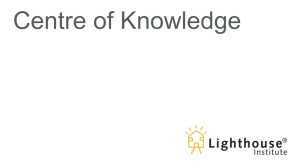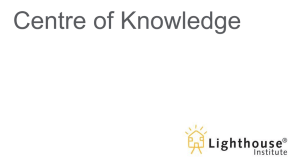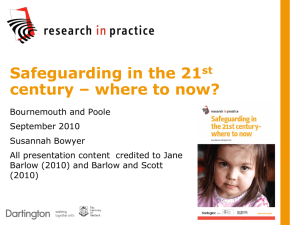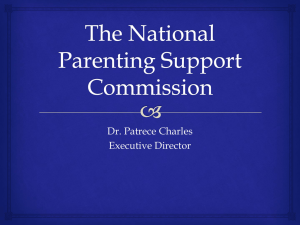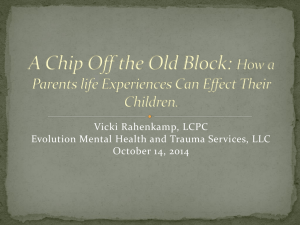Therapeutic parenting – Christine Gordon
advertisement
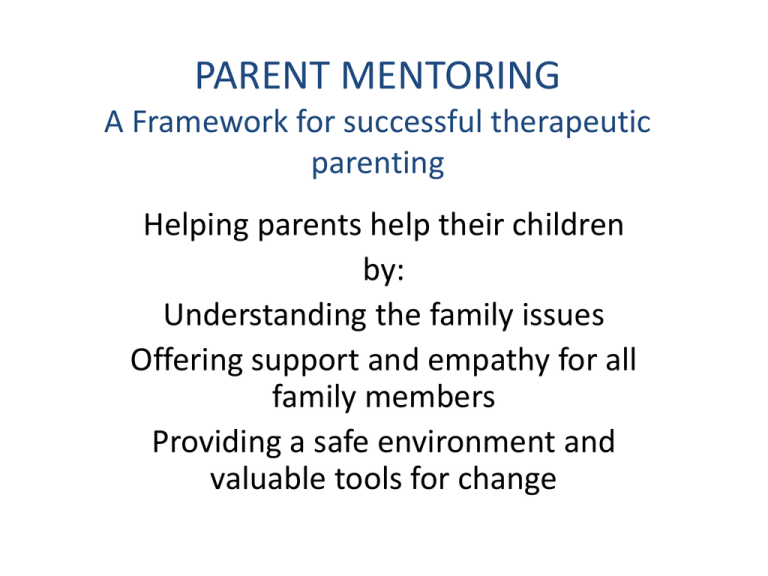
PARENT MENTORING A Framework for successful therapeutic parenting Helping parents help their children by: Understanding the family issues Offering support and empathy for all family members Providing a safe environment and valuable tools for change Principles of Therapeutic Parenting • Children need to ‘go back to go forward’ – to help them fill the emotional gaps • Considers all aspects of a child’s functioning – impact of trauma on neurobiological system – developmental trauma issues – attachment patterns – current behaviour – executive functioning difficulties Therapeutic Parenting Support • Starts with understanding the child’s history – what was done to the child – what it did to the child • Recognises the ways in which this continues to impact in the present – at a body, brain, behavioural and cognitive levels • Recognises the impact on parents – Secondary trauma • Recognises the impact of parents’ own history – we all have attachment and trauma issues • Allows parents to feel safe enough to explore their responses and make changes: to provide a safe environment for their children do the same How Parent Mentoring Helps • Bespoke programme to meet individual needs of each family and each family member. Common elements: providing parents with: • Understanding of the reasons for their child’s difficulties and current behaviour • A parenting plan that is relevant and flexible • Encouragement to consider new ways of parenting • Support to put plans and strategies into action • Confidence to become effective therapeutic parents Aims of Parent Mentoring Programme • Developing greater understanding of the reasons for the child’s difficulties. • Reducing conflict and stress in families. • Putting parents in loving control within their families. • Giving children opportunities to trust their parents are really there for them and can meet their needs. • Providing an infrastructure that allows children to change and manage their lives in a healthier ways. • Establishing a safe ‘holding’ environment for parents. • Help for parents look at any difficulties they have in implementing the programme: including personal issues that may be having an impact. The Pilot in Scotland Attachment in Action • • • • Six month programme Minimum of weekly telephone/email support Opportunity to contact their parent mentor during family crisis Specific strategies and suggestions for parents to put into practise In reality the programme in practice offered much more than this and highlighted the need for additional elements: extension of programme to 9 months support for Parent Mentors – a team approach educational interventions male perspective Integrated package of support Identification of persisting sensori-motor issues Key Concepts of Therapeutic Parenting • ‘Practising’ – for both parents and children: ‘we’ not ‘you’ – We all make mistakes when we practise, it’s what we learn from those mistakes that is important • Shared responsibility – between mentor and parents – between parents and children • ‘Going backwards to move forwards’ – thinking toddler • ‘Language of Trauma’ – recognising that children’s behaviour is the language they use to let you know what is going on for them – Understanding that their first language is the one that was ‘spoken in their birth family; i.e. the language of trauma Key concepts - continued • When to intervene verbally: to work out ‘what happened’ and ‘what we could do next time’ — before the child dysregulates by trying to anticipate situations that will be difficult for the child — after the event when the child is regulated again, recognising that this may be several hours later • Helping children recognise what is going on for them – in this order — at a body level — at a feeling level — at a cognitive level • Parents need to look after themselves — often the hardest thing for parents to do! Final Reflections • That families are the best environment for children to grow and develop • We start from the principle that children and parents are doing the best they can – it’s not ‘won’t do’; rather it’s ‘can’t do’ • We believe that children and parents want to be happy together as a family • It’s the parent mentor’s job to show them ways they can do what they want to do and are able to do. Parenting Mentoring for Wales? • How could we develop a similar Parent Mentoring programme for Wales? • Are you interesting in learning more about Parent Mentoring as a valuable therapeutic support to therapeutic parents? • Would you consider undertaking Parent Mentor training locally? • Could you or your agency make use of such a service?





